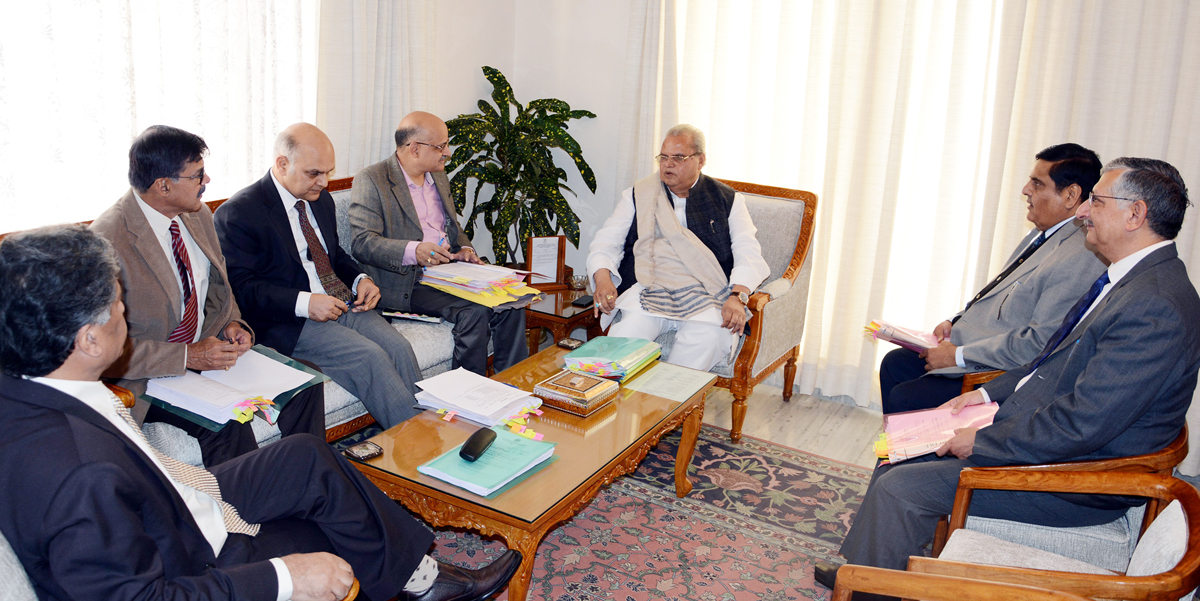Safeguards provided for actions taken earlier
Govt can take back occupied land from applicants any time
Mohinder Verma
JAMMU, Nov 28: In order to ensure that no more benefits are extended to the occupants of the State land, the State Administrative Council, which met under the chairmanship of Governor Satya Pal Malik today, repealed controversial Jammu and Kashmir State Lands (Vesting of Ownership to the Occupants) Act, 2001 commonly known as Roshni Scheme. Due to this, around 77,000 applications pending with the Deputy Commissioners across the State have become infructuous and the Government can take back huge chunk of occupied land from the applicants as and when need arises.
The State Administrative Council (SAC) took this important decision after careful consideration of all pros and cons of the Roshni Scheme. The Governor and his four Advisors B B Vyas, K Vijay Kumar, Khurshid Ahmad Ganai and K K Sharma were of the unanimous view that the much-hyped scheme has not served the desired purpose and is no longer relevant in the present context.
While repealing the scheme, the SAC has provided sufficient safeguards for the actions taken earlier by the concerned authorities under the provisions of the scheme. “All pending proceedings under the Act shall stand cancelled immediately and abate. However, any action taken under the provisions of the repealed Act earlier shall not be invalid”, the SAC made it clear.
According to the sources in the Revenue Department, around 77,000 applications are pending with the Deputy Commissioners across the State during the past several years seeking benefit of Roshni Scheme and with the decision of the SAC all have become infructuous.
“Now, the Government can take back occupied land from the applicants as and when need arises”, they said, adding “the occupants can put to use the occupied land for agriculture and allied activities only but cannot raise construction of any nature, which if noticed would be dismantled by the Government”.
This is the second major decision on the Roshni Scheme as few days back the State High Court in a Public Interest Litigation (PIL) titled Ankur Sharma versus State of J&K challenging validity of J&K State Land (Vesting of Ownership to the Occupants) Act had directed that neither the occupants having been conferred upon the ownership rights shall sell these lands nor can raise constructions on such lands.
The High Court passed this direction after it was apprised that the Act violated the doctrine of equality and created a special class of society for conferring undue benefits at the will and whims of the political entities.
“The legislation was conceived to reward the violators of law, who instead of being booked for grabbing the State land, were conferred with the ownership rights”, the PIL said, adding “nowhere in the country such a legislation was ever enacted to give premium to those who indulged in land grabbing as such legislation being against public policy and constitutional mandate is required to be declared unconstitutional”.
Even the Comptroller and Auditor General of India, in its report tabled in the State Legislature in 2014, had dubbed the Roshni Scheme as biggest ever land scam of Jammu and Kashmir after it noticed deficiencies in the formulation of the Rules and also large scale irregularities in the implementation of the Act.
The supreme audit institution of the country had found significant variations in unit price approved by the committees for different occupants in the same area or locality in order to confer undue benefit to the occupants of the land.
“The provision of rebates, incentives and penalties was not in consonance with the provisions of the Act and while laying down the parameters for fixing the price of the land by the notified committees, the Act mandated vide Section 12(2) that the committees shall take into consideration potential value of the land and the market value of land determined for the purpose of Stamp Duty under the Stamps Act. However, the Rules of the Roshni Act provided for differential pricing of land depending upon the size of plot, category of occupants or end use of the land by prescribing different rates of rebates over land prices assessed by the statutory committee”, the CAG had observed.
Though State Vigilance Organization (presently Anti-Corruption Bureau) had also conducted probe into the instances of irregularities brought to the fore by the Comptroller and Auditor General of India and even Committee on Public Accounts of the Legislative Assembly had taken up audit paragraphs for discussion and remedial measures but the exercise never reached the logical conclusion.
It is pertinent to mention here that Jammu and Kashmir State Lands (Vesting of Ownership to the Occupants) Act was enacted in the year 2001 with the objectives of generating resources for financing power projects and conferment of proprietary rights to the occupants of the State land.
The Act was believed to be a revolutionary step in the annals of history in Jammu and Kashmir after the Agrarian Reforms Act. It was hoped that the legislation would help to boost the farming sector and in turn generate substantial revenue for funding power projects across the State.
The scheme initially envisaged conferment of proprietary rights of around 20.55 lakh kanals to the occupants of which only 15.85% land was approved for vesting of ownership rights. Against the expected/anticipated revenue from such occupants, the revenue actually generated has been meagre thereby failing to realize the objectives of the scheme.


